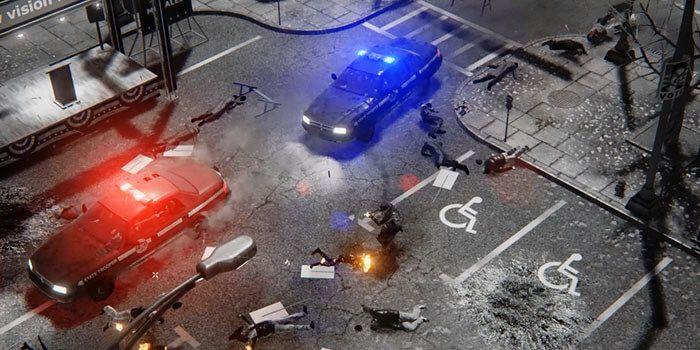[HTML1]
If video games are going to be taken seriously as a creative medium, then the community needs to welcome developers from varied backgrounds, and with opposing points of view. Sometimes, that means reexamining what really constitutes a game, or putting up with a title that's ideologically repellent. For the sake of expanding the community, if gamers are going to welcome games like Gone Home into the fold, they're going to have to put up with things like Hatred as well.
That doesn't mean that everyone has to like it, of course. Epic Games had every right to remove their logo from Destructive Creations' upcoming massacre-simulator, which casts players as an "Antagonist" and asks them to brutally murder as many innocent people as possible. It's one thing to tolerate a game; it's another entirely to endorse it.
Soon, players will get their own chance to protest Hatred's stylish brand of ultra-violence. Hatred comes out on June 1st, at which point players can promptly decide not to buy it. Internet outrage makes for good headlines, but if gamers really want to send a message, they need to hit Destructive Creations where it hurts: in the wallet. (Notably, Hatred was supposed to come out May 19th, but Destructive Creations delayed the game because "honestly speaking we will be playing The Witcher 3 then.")
Hatred isn't the first game to use over-the-top violence as a marketing hook, and it probably won't be the last. Postal and Manhunt rose to fame because of their political incorrectness, not their gameplay, and to the general public Mortal Kombat is more about gruesome fatalities than a mechanically sound fighting game. Still, with those titles, there are (arguably) strong games underneath the blood-soaked aesthetics. With Hatred, the jury's still out.
That's really gets to the crux of the controversy surrounding Hatred. Despite all of Destructive Creations' talk about creating "a pure gaming pleasure," to many observers Hatred doesn't really look that fun. Destructive Creations tells players not to take Hatred seriously, but the game's marketing materials take themselves too seriously. It's an inconsistent message that doesn't come across as wholly genuine; that makes the game's violence look like a callous marketing ploy, not a creative choice. There's no such thing as bad press, after all, and if Hatred hadn't been controversial, it likely wouldn't have gotten any attention at all.
Was Gabe Newell right when he put Hatred back on Steam Greenlight, after well-meaning but overzealous staffers removed it? Absolutely. Does that mean it's going to be a good game? Not at all. It's important that developers feel empowered to release the games that they believe in; it's also important to remember that absolutely nobody has to buy them.
Hatred comes out June 1, 2015 for PC.

